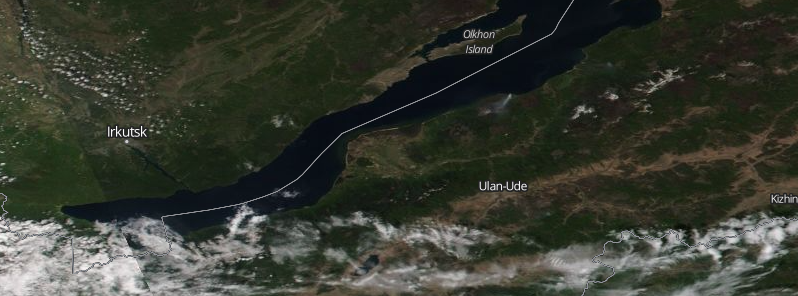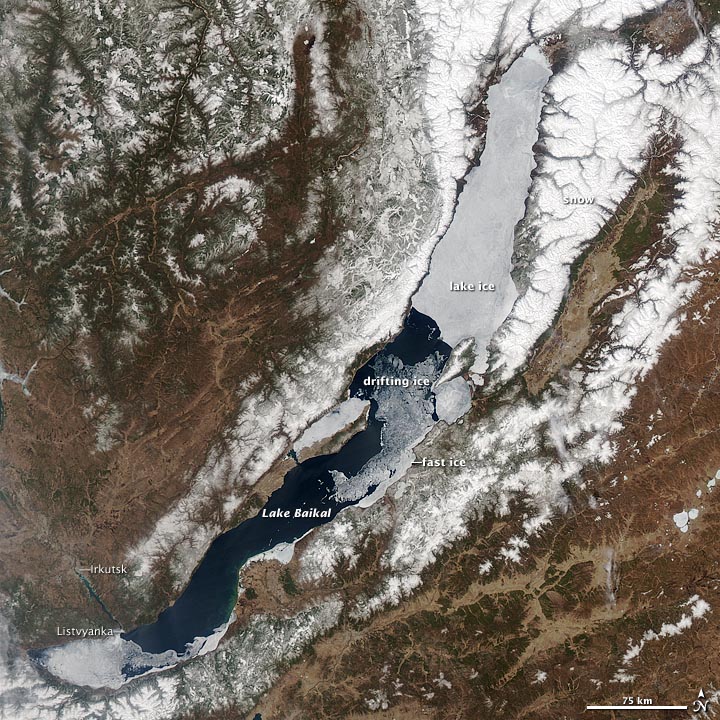Lake Baikal on the verge of unprecedented environmental catastrophe

Lake Baikal, the 25 million-year-old lake, and UNESCO's heritage site, is on the verge of environmental catastrophe, Russia's environmentalists warn. The proposed Mongolian hydro project could potentially disrupt the inflows and cause a tsunami of water in case of any seismic activity, frequent in that region.
According to local media reports, three hydro power stations planned on the Selenga River and its tributaries may cause the lake to dry out, and if certain measures are not taken, it might disappear like the Aral Sea, once one of the four largest lakes in the world.
The Mongolian hydro project could pose a severe risk for Ulan-Ude, the Buryatian capital, in case one of three planned dams suffers an accident.
"Potential damage from the third hydro power station which will be located on the Eg River (a Selenga tributary) could cause a huge catastrophe. Hydrological experts believe that this power station is the most dangerous of all. This power station will be located in the seismically active part of Mongolia. And any seismic activity can cause all the stored water to wash away part of Mongolia and in half a day it would reach Ulan-Ude' – a city with a population of 415 000. At the same time, the speed of water will be compatible to a tsunami," Sergey Shapkhayev, an environmental activist said.
A session at the Ministry of Natural Resources held in April 2016, established the Mongolian plans could trigger atmospherical, biological, hydrological, and geological changes:
"The quality of water, its ice and temperature regime will also change. Additional emission of greenhouse gasses will increase the threat of flooding of some areas. The migration of animals, rare fish species, in particular, will also be negatively affected. Apart from that, the implementation of these hydro-technical projects will cause additional seismic, epidemiological and other risks."

Spring ice melt underway on Lake Baikal. May 4, 2012. Credit: NASA/EO
The decrease of the Baikal's levels has already caused the wells, situated as far as 300 km (186 miles) away, to dry out, and 13 settlements on the shores of the lake are facing the shortage of water supplies.
"We have unique scientific potential and expertise in construction, and that is why it is possible to transfer power from Siberia and develop new export agreements. Otherwise, less than 1 000 GW of power will destroy the largest unfrozen water reservoir on the Earth, (and) will destroy the delta of the Selenga River, and cut access to fresh water in Buryatia and Irkutsk region," said Oleg Lebedev, a member of the Higher Environmental Council, and a deputy of the Russian parliament.
"The hydrological resources of Mongolia are not sufficient to produce significant power capacities. The three rivers discussed now do not have particular potential to generate enough power to sort out the electricity deficit. Of course, it's easier to build a hydro power station – green energy – but it's clearly an exaggeration to consider that hydro power can become the main power source for Mongolia," said Andrey Grozin, of the Institute of the CIS countries.
According to some opinions, to compare Lake Baikal with the Aral Sea is far fetched, as Aral, once one of the four largest lakes in the world, suffered substantial dry out, caused by the Soviet plants to divert rivers for irrigation. The volume in Aral was about 1 089 cubic kilometers before it dried out, and it dropped down to only 75 cubic kilometers by 2007. Lake Baikal covers an area larger than Belgium and contains 23 615 cubic kilometers of water.
Lake Baikal is the largest reservoir of fresh water on Earth. It contains 20% of the unfrozen drinking water on the planet and is a home to a rare and diverse ecosystem. It hosts 1 340 animal species and 570 plants, of which 745 animals and 150 plants can't be found anywhere else on Earth. Its depth is about some 1 700m (5 577 feet). The lake is also the world's oldest, dating back about 25 million years.
In January 2015, the lake levels dropped to the lowest point recorded over the last 60 years, and the authorities in Buryatia and Irkutsk declared a state of emergency on the occasion.
Massive wildfires that severely devastated the region around Lake Baikal in September 2015, also damaged the water balance in the lake, literally killing the water arteries. Numerous experts already warned about that the situation in and around the lake was close to catastrophic. The human impact has left a dire mark on the lake: "Baikal can't swallow it all," said Dr. Oleg Timoshkin, researchers at the Russian Academy of Sciences in Irkutsk, warning about an impending disaster unfolding at, once, the cleanest lake on the planet.
See also:

Video credit: Journeyman Pictures
Featured image: Lake Baikal, June 4, 2016. Credit: NASA/NOAA/DoD Suomi NPP VIIRS

Commenting rules and guidelines
We value the thoughts and opinions of our readers and welcome healthy discussions on our website. In order to maintain a respectful and positive community, we ask that all commenters follow these rules:
We reserve the right to remove any comments that violate these rules. By commenting on our website, you agree to abide by these guidelines. Thank you for helping to create a positive and welcoming environment for all.